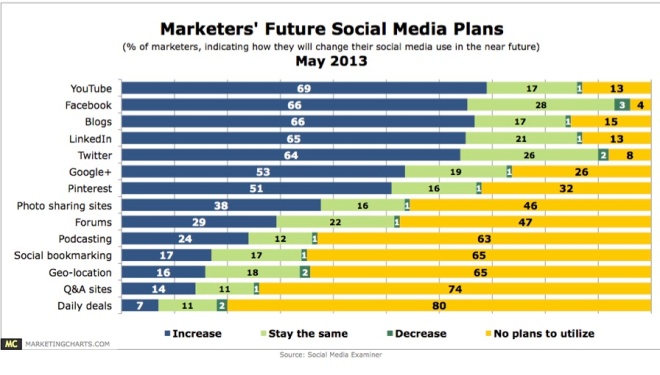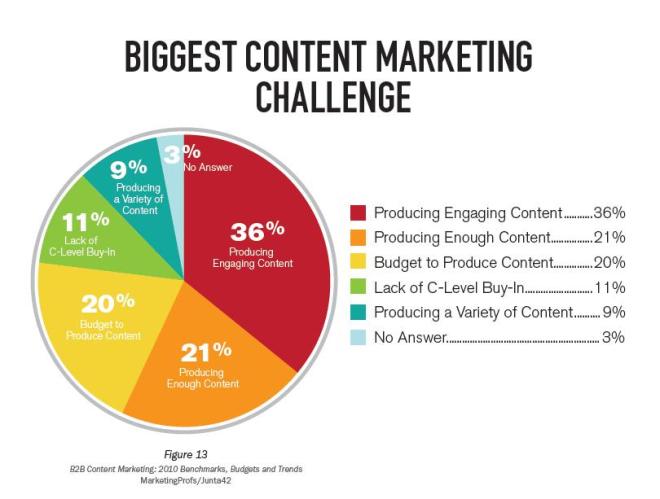Social Media Examiner has just released its annual Social Media Marketing report. It reveals some interesting data about this year’s social media marketing trends. The entire report is available for download here, but I’d like to highlight some of the report’s most surprising and significant points. In a survey of 3,025 marketers, the study determined the following:
-The use of social bookmarking sites has plummeted from 26% of respondents in 2011 to just 10% in 2013. De.licio.us, DIGG, Friendfeed, etc., are rapidly falling in favor where marketers are concerned. (According to ebizMBA, the most popular bookmarking sites are currently Twitter, Pinterest, Reddit and StumbleUpon.)
–Forums (24% in 2011; 16% this year) and geo-location services such as Foursquare (17% in 2011; 11% this year) are also in decline.
–Respondents with more than 5 years experience are far more likely to use LinkedInLNKD -1.43% than the average respondent (92% vs. 70%).
–Marketers who spend more than 40 hours a week on social media are more heavily focused on Pinterest, Google GOOG -1.1%+, Instagram and YouTube than those who spending 6 hours a week or less on social media marketing.
–Biz-to-Consumer marketers have adoptedFacebook FB -2.94% at a greater rate than Biz-to-Biz marketers; however, the opposite is true for LinkedIn. Although Facebook is the most important social platform for a strong majority (67%) of B2C marketers, Facebook and LinkedIn are tied among B2B marketers at 29% each.
–67% of marketers plan to increase their Twitter activities. This is a significant majority, but is down slightly from 69% last year and 73% in 2011. Younger marketers are much more likely to use photo sharing sites such as Instagram than their older counterparts.
-Here’s the biggest shocker, for me: the report says80% of marketers have no plans to use daily deal sites, such as Groupon GRPN +1.28% or LivingSocial in the near future.
About the Data: Of the 3025 marketing participants in the study, 56% primarily target consumers and 44% target businesses. 72% of the respondents are 30-59. Females represented 62% of the survey sample. 57% are in the U.S., with the U.K. (9%) being the next-most heavily represented country.
Some of the data is not surprising. The use of bookmarking sites and forums has never emerged as a mainstream tactic for marketing pros. In fact, as reported by fellow contributor David K. Williams, the most popular forums and bookmarking sites are most heavily skewed towards entertainment and ‘funny pictures’, current research maintains.
Reddit and Digg are the top social bookmarking sites that continue to have the most power remaining for marketing and managing traffic en masse. On the flip side, the most surprising finding in the new report is that 80% of marketers surveyed aren’t planning on using a daily deal site for their marketing efforts this year.
Marketers’ Dream Come True?
The decreased plans for daily deals is the finding that, for me, presents the biggest surprise. In my experience (and that of others I have interviewed recently), daily deal sites are highly beneficial to brand marketers and products because of the “no cost” efficiency the model presents.
For example, Mike McEwan, owner and CEO of Very Jane (a daily deal site for boutique fashion, jewelry and accessories), notes that many of his sellers depend on the marketing they do through his site as their primary source of income. Says McEwan: “I have personally seen many small, obscure sellers and brands get their start from a daily deal on our site that went viral.”
Thousands of sellers market boutique items on etsy, eBay, or Amazon. However, each seller is in charge of their own promotion in these platforms and are competing with hundreds of sellers with very similar items. For a new or emerging brand to gain access to an efficient marketing avenue that is already established and efficient with no upfront costs would appear for many to be a marketer’s dream come true.
Lifetime Value of a Customer
For marketers who work for an established brand, daily deal sites may seem like a lose/lose proposition, since the most common model splits revenues between the manufacturer and the site at a ratio of somewhere around 50/50. When you consider that the “deal” is generally at least 50% off retail price, the math doesn’t seem to leave room for a workable profit. However, the lifetime value of a customer is the piece of the equation many marketers are inclined to ignore. Here’s the equation for the LTV (Lifetime Value) of a customer (courtesy of Brad Sugars, Entrepreneur.com):
(Average Value of a Sale) X (Number of Repeat Transactions) X (Average Retention Time in Months or Years for a Typical Customer)
Now the equation looks different. According to Sugars, it’s the lifetime value of your customers, in the end, that will determine the ultimate success of your company. What are your own online marketing plans for the remainder of 2013? Do you agree with the study’s results? I welcome your thoughts.


